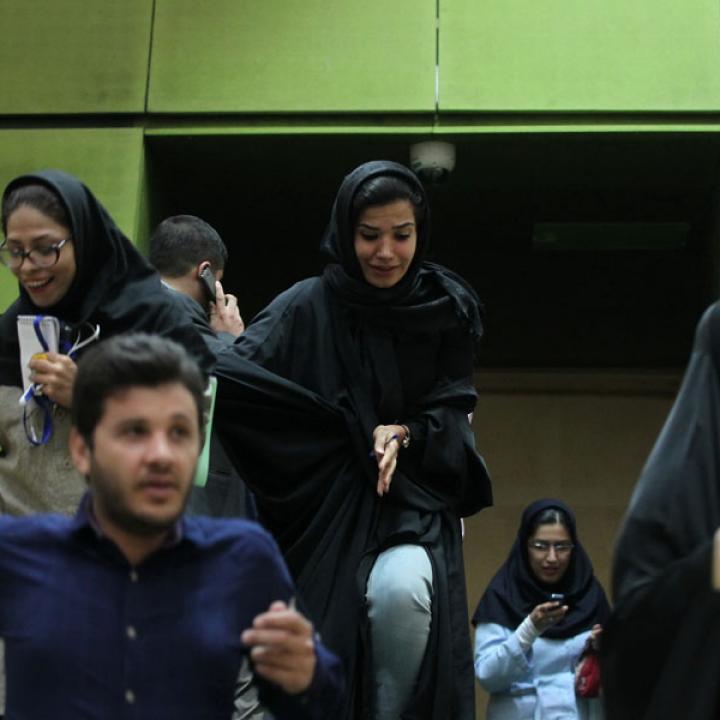
- Policy Analysis
- Policy Alert
How Will Iran Respond to Terrorist Attacks in the Heart of the Islamic Republic?

Considering the current regional situation, the country's first serious terrorist attacks in many years could have major implications for Tehran's policies at home and abroad.
On June 7, coordinated terrorist attacks targeted two key landmarks in Iran: Ayatollah Ruhollah Khomeini's mausoleum south of Tehran and the parliament building in the heart of the capital. The perpetrators used suicide vests and Kalashnikovs to kill and wound dozens of people. An Islamic State (IS) website claimed responsibility for the attacks.
Supreme Leader Ali Khamenei responded quickly to the incident, vowing to eradicate those responsible. Similarly, the intelligence chief for the Islamic Revolutionary Guard Corps (IRGC), Gen. Mohammad Hossein Nejat, promised action against any individuals involved in the plot, as well as the countries that supposedly ordered it.
Although the attackers were unable to reach their main targets, they did enter the grounds of both the parliament building and the resting place of the Islamic Republic's founding father on the anniversary of his death -- a severe blow to the image of security and stability that the regime has long sought to project. The attacks might also have major implications for Iran's regional policies. The IRGC immediately published a statement linking the attacks to President Trump's recent visit with Gulf leaders in Saudi Arabia, blaming Riyadh for indirectly perpetrating the attacks by supporting IS and vowing to retaliate.
In the past, the Saudis have repeatedly denied interfering with Iran's internal affairs or planting terrorist cells within its borders, but Riyadh's recent rhetoric has left it open to Tehran's accusations. On May 2, for example, Deputy Crown Prince Muhammed bin Salman spoke out against Iran's perceived campaign to take over the kingdom's holy cities. He then threatened to take this battle back to Iran -- a warning that Tehran took very seriously at the time.
While public blame games will likely continue, Iran will probably avoid any overt escalation with Saudi Arabia, instead increasing its covert support for Shiite militant activities in the kingdom and neighboring Bahrain. This could include pushing local proxies to launch bold attacks against major cities and government installations. The Saudis and other Gulf leaders are already extremely nervous about any possibility of Iran interfering in their current diplomatic row with Qatar, as evidenced by unconfirmed Arab media reports that the IRGC is now providing personal protection to the Qatari emir.
As for salvaging the IRGC's reputation after a seemingly major security failure in Tehran, the regime will no doubt heap praise on the Guards for their relative swiftness in arriving on the scene and killing the terrorists. For its part, the IRGC will probably use the situation as an excuse to become even more assertive in Hassan Rouhani's second presidential term, taking a freer hand to operate both inside and outside Iran -- perhaps with the full blessing of the legislators targeted in today's attack. And the IRGC's notorious intelligence branch will likely vie for the upper hand against the civilian Ministry of Intelligence.
Additional consequences could unfold if the attackers are proven to hail from a Sunni-majority southeastern province of Iran, as implied by their accents in an online video IS released during the attack. In that case, one could expect the regime to take a more heavy-handed carrot-and-stick approach in the province, putting greater pressure on ethnic Sunnis living there to distance themselves from any insurgent activities.
Currently, the IRGC controls southeastern Iran via its "Qods sector headquarters" and Salman Provincial Corps, which includes the 110th Salman Special Operations Brigade in Zahedan and the Ali Akbar Brigade in Zabol, both located in the province of Sistan and Baluchestan. Members of these units have had extensive experience fighting rebels in Syria. If Tehran decides to launch forays into Pakistan to seek out suspected IS-affiliated militant hideouts, these southeastern units could be supported by members of the IRGC's 33rd Jahrom Airborne Brigade. Alternatively, they could use a lower-risk option: missile and artillery attacks with drones acting as overhead observers. In April, sniper fire purportedly coming from Pakistan killed ten Iranian border guards. Tehran blamed Sunni militant groups for the attack, warning them against any further cross-border terrorist activities and threatening to target their bases deep inside Pakistan. At the time, the Iranian Baluchi insurgent group Jaish al-Adl claimed responsibility for the incident. In such instances, Iran usually blames Saudi Arabia for financing and arming Iranian Sunni groups.
Finally, Tehran might decide to use the latest episode as a pretext for increasing its military presence in Syria and Iraq. Iranian leaders have been particularly concerned about the U.S.-led coalition's increased activities in eastern and southern Syria, which are hampering freedom of movement by Iranian-backed militias across the Syria-Iraq border. Determined to open a land route to its allies in Syria and Lebanon, Tehran could try to preempt the coalition by pouring more resources into Syria and demanding a role in retaking Raqqa from IS.
Farzin Nadimi is a Washington-based analyst specializing in the security and defense affairs of Iran and the Persian Gulf region.



